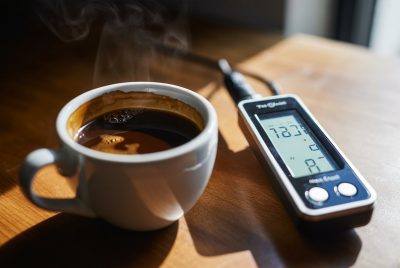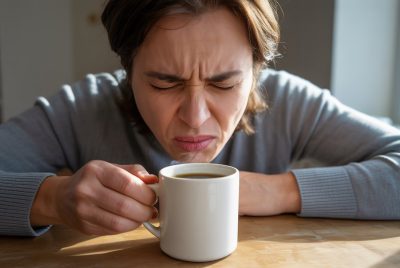How Long Does Coffee Take to Kick in
*We may earn a commission for purchases made using our links. Please see our disclosure to learn more.
If you’ve ever sipped on a steaming mug of coffee, you might have wondered just how long it takes for that caffeinated kick to hit your system. It’s the morning elixir that promises to pry open our sleepy eyes and get us ready for the day ahead. But sometimes, time drags on after draining our cups, leaving us questioning when we’ll feel that familiar buzz.
Did you know it can take as little as 10 minutes to start feeling the effects of your favorite brew? Hang tight because we’re going on a journey through the ins and outs of caffeine’s swift dash into action. You’ll learn not only how quickly coffee can work its magic but also what determines that speed. Get ready to uncover all there is to know about getting the most from your daily java jolt!
How caffeine affects the body
Caffeine affects the body by stimulating the central nervous system, increasing alertness and reducing feelings of fatigue. It can also increase heart rate, improve physical performance, and enhance cognitive function.
Short-term effects
Once you sip your morning coffee, the caffeine begins to work its magic. Within just 10 minutes, you may start to feel more awake and energized as it stimulates your central nervous system.
This quick response time can be a blessing during early mornings or mid-afternoon slumps when you need that extra jolt of energy.
The stimulant effects continue to rise, reaching their peak roughly around 30 minutes after consumption. During this time, many people notice an increase in alertness and improved cognitive function which aids in completing tasks or engaging in physical work more efficiently.
With the help of caffeine’s boost, productivity can see a significant uptick.
Sensitivity plays a big role in how individuals experience these short-term effects. Some might find themselves buzzing with energy faster than others due to lower tolerance levels or faster metabolism rates.
As the heart rate picks up from coffee intake, those who are particularly sensitive might also feel the rush earlier and more intensely than their peers.
Long-term effects
After considering the short-term effects of caffeine, it’s essential to contemplate its long-term impacts on the body. Regular consumption of caffeine can lead to increased tolerance levels, meaning that over time, individuals may require higher doses to experience the same stimulating effects.
Moreover, prolonged and excessive use of caffeine may contribute to disrupted sleep patterns, leading to difficulties in falling asleep or staying asleep. This can result in chronic fatigue and decreased overall energy levels throughout the day.
Furthermore, consistent intake of high amounts of caffeine has been associated with potential negative effects on heart health, such as increased heart rate and blood pressure. Over time, these factors could contribute to an elevated risk for cardiovascular issues.
How long it takes for caffeine to kick in
Caffeine typically takes around 15 to 45 minutes to kick in after consumption. However, this can vary depending on factors like metabolism, body weight, and tolerance levels. Additionally, the half-life of caffeine means its effects can last for several hours.

Factors that impact caffeine absorption
Factors that impact caffeine absorption include:
- Body weight: Individuals with higher body weight may experience a slower absorption rate due to dilution of caffeine in a larger volume of body fluids.
- Metabolism: Faster metabolism can lead to quicker breakdown and absorption of caffeine into the bloodstream.
- Liver enzymes: Variations in liver enzyme activity can affect how quickly the body processes and eliminates caffeine.
- Genetics: Genetic differences can influence the speed at which individuals metabolize caffeine, affecting its absorption rate.
- Medications or supplements: Certain medications or supplements can interact with caffeine, potentially altering its absorption and effects on the body.
- Food consumption: Eating food before consuming caffeine may slow down its absorption due to competition for digestion and absorption in the gastrointestinal tract.
The half-life of caffeine
The half-life of caffeine is around 3 to 5 hours for most individuals, meaning that it takes this amount of time for the body to eliminate half of the caffeine consumed. However, this duration can be affected by various factors such as age, liver function, pregnancy, and certain medications.
For example, pregnant women may have a longer caffeine half-life due to changes in hormone levels affecting metabolism, while those with liver issues may process caffeine more slowly.
Moreover, individual variability plays a significant role in determining how long it takes for caffeine to be metabolized in the body. Factors like genetics and overall health can influence the rate at which the body breaks down and eliminates caffeine.
How to make caffeine kick in faster
Drinking coffee on an empty stomach can help caffeine kick in faster, as well as opting for stronger brews and taking black coffee. Another trick is to drink coffee before a power nap for maximum effect.
Drinking coffee on an empty stomach
Drinking coffee on an empty stomach can lead to a faster caffeine kick, as there are no other substances in the digestive system that could slow down its absorption. This means that when you have your morning brew before breakfast, the caffeine starts to take effect relatively quickly, giving you that much-needed energy boost to start your day.
However, it’s important to note that consuming coffee on an empty stomach may also increase the risk of acid reflux for some individuals due to the higher acidity of the drink.
If you’re looking for ways to make caffeine kick in faster without having coffee on an empty stomach, consider trying a few sips of water before and after your cup of coffee — hydration could help speed up absorption.
Taking black coffee
Black coffee can be a quick way to kick in the effects of caffeine as it contains no added sugar or cream, which could slow down absorption. The caffeine in black coffee can start to take effect within 10-15 minutes of consumption and peak in the bloodstream around 30 minutes later, providing a rapid boost in alertness and energy.
For some individuals, the impact of black coffee may last for several hours due to its high caffeine content.
To make the most out of black coffee’s stimulating effects, it’s best consumed on an empty stomach or before light meals to speed up absorption. Additionally, opting for darker roasts can provide a stronger brew with higher caffeine levels, amplifying its energizing properties.
Opting for stronger brews
For a quicker caffeine kick, choosing stronger brews can be beneficial. Opt for darker roasted coffee or espresso to increase the caffeine content per serving. These options contain higher concentrations of caffeine, which can lead to a faster onset of effects.
With more robust brews, individuals may experience a swifter boost in alertness and energy due to the heightened caffeine levels compared to milder blends.
When selecting your preferred coffee beverage, keep in mind that stronger brews offer an accelerated release of caffeine into the bloodstream. This rapid absorption can result in a more immediate impact on cognitive function and physical performance.
By opting for stronger brews, individuals can potentially enhance their productivity and mental acuity sooner after consumption.
Drinking coffee before a power nap
To enhance the effectiveness of a power nap, consider drinking coffee before taking a short snooze. Known as a coffee nap, this technique involves consuming caffeine right before a 15- to 20-minute nap.
When you wake up from your power nap, the caffeine will have begun to take effect in your body due to the usual onset time of about 30 minutes. This combined approach can maximize the restorative benefits of napping while also tapping into the energizing effects of caffeine.
By combining the restorative power of napping with the stimulating effects of caffeine, individuals can experience improved alertness and cognitive function upon waking. The synergy between these two methods is attributed to how adenosine (a chemical that promotes sleep) is blocked by caffeine’s presence, thus reducing grogginess upon waking.
How long caffeine stays in your system
Factors that influence caffeine metabolism and the importance of moderation and timing with caffeine consumption. To learn more about how long it takes for coffee to kick in and other caffeine-related topics, keep reading!
Factors that influence caffeine metabolism
Caffeine metabolism is influenced by several factors, including:
- Individual Sensitivity: The way caffeine affects a person is influenced by their individual sensitivity to the substance. Some individuals may feel its effects more quickly and intensely than others.
- Body Weight: The impact of caffeine can be influenced by a person’s body weight. Generally, individuals with lower body weight may experience stronger effects from the same amount of caffeine compared to those with higher body weight.
- Metabolism Rate: The rate at which a person’s body metabolizes caffeine can affect how long it takes for the substance to kick in and how long its effects last.
- Overall Health: An individual’s overall health, including their liver function and any existing medical conditions, can influence how their body processes and responds to caffeine.
- Tolerance Levels: Over time, regular caffeine consumption can lead to an increase in tolerance levels, impacting both the onset and duration of its effects on an individual.
- Age: Age can also play a role in caffeine metabolism, as younger individuals may process caffeine differently than older adults due to variations in metabolism rates.
- Medications and Hormones: Certain medications or hormonal fluctuations within the body can affect the way that caffeine is metabolized and its resulting effects.
Importance of moderation and timing with caffeine consumption
Factors that influence caffeine metabolism can play a crucial role in determining the impact of caffeine on an individual. It’s essential to understand the importance of moderation when it comes to consuming caffeinated beverages.
While moderate consumption may enhance alertness and cognitive function, excessive intake can lead to adverse effects such as restlessness, increased heart rate, and even insomnia.
Timing also plays a significant role in maximizing the benefits of caffeine without experiencing unwanted side effects. By understanding the duration of caffeine’s effects and its half-life, individuals can strategically plan their consumption for optimal performance without disrupting their sleep patterns.
Notably, individual sensitivity and tolerance levels should be considered when determining the appropriate timing and amount of caffeine consumption. Factors such as body weight, metabolism, and overall health can influence how quickly caffeine takes effect and how long its stimulating properties last in the body.
Conclusion
In conclusion, understanding the timeframe for caffeine to take effect is essential for optimizing its benefits. By making simple adjustments like drinking coffee on an empty stomach or opting for stronger brews, you can harness the stimulating effects of caffeine more efficiently.
These practical strategies can lead to a noticeable impact on your energy levels and cognitive performance throughout the day. Whether it’s for work or physical activity, timing your caffeine consumption strategically can make a significant difference in your daily productivity and well-being.
As you explore these methods further, consider how they align with your own experiences and lifestyle preferences, allowing you to tailor them to suit your individual needs effectively.
FAQs
Q1. How long does it take for coffee to kick in?
Coffee starts to kick in quickly, usually around 15 to 30 minutes after you drink it, giving you that energy boost or coffee rush.
Q2. What’s the duration of caffeine effects from a cup of coffee?
The impact of caffeine on your body from a single cup of coffee can last about 3 to 5 hours before it starts wearing off.
Q3. Can everyone feel the effects of coffee at the same time?
No, some people might be more sensitive to caffeine than others. Caffeine sensitivity changes how fast someone feels its effects and even how strong those effects are.
Q4. Does drinking coffee affect your heart rate?
Yes, when caffeine activates in your body, it can speed up your heart rate because it stimulates your system like an energy drink would.
Q5. Besides feeling awake, what else does caffeine do for you?
Caffeine doesn’t just wake you up; it also boosts physical performance and cognitive function by helping you focus better and perform tasks effectively.




